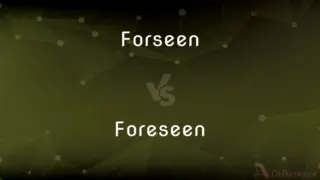Affectatious vs. Affectation — Which is Correct Spelling?
By Tayyaba Rehman & Fiza Rafique — Updated on April 25, 2024
"Affectatious" is the incorrect spelling of "affectation," which means an artificial or unnatural mannerism.

Table of Contents
Which is correct: Affectatious or Affectation
How to spell Affectation?

Affectatious
Incorrect Spelling

Affectation
Correct Spelling
ADVERTISEMENT
Key Differences
The correct term, "affectation," ends with "-tion," a common suffix for nouns indicating a state or condition.
"Affectation" is recognized in standard dictionaries, whereas "affectatious" is not a standard English word.
Recall that "affectation" comes from the Latin "affectatio," meaning a striving after, and does not include the suffix "ous," which is typically used for adjectives.
How Do You Spell Affectation Correctly?
Incorrect: The critique pointed out the author’s use of affectatious dialogue.
Correct: The critique pointed out the author’s use of affectation in dialogue.
Incorrect: She spoke in an affectatious tone, which seemed insincere.
Correct: She spoke with affectation, which seemed insincere.
ADVERTISEMENT
Incorrect: His affectatious display of knowledge was unconvincing.
Correct: His affectation of knowledge was unconvincing.
Incorrect: Everyone noticed her affectatious manner at the party.
Correct: Everyone noticed her affectation at the party.
Incorrect: His affectatious laughter did not seem genuine.
Correct: His affectation of laughter did not seem genuine.
Affectation Definitions
A mannerism or habit that is assumed rather than natural.
His affectation of a British accent amused his friends.
A studied display of real or pretended feeling.
Her tears were more an affectation than a sign of true sadness.
Artificiality in speech, behavior, or appearance.
Her affectation of sophistication did not impress those who knew her well.
Ostentation in manners or appearance, often to attract notice.
Wearing such extravagant hats was purely for affectation.
A mannerism or habit that is assumed rather than natural, especially to impress others.
Behavior characterized by such mannerisms or habits; artificiality
A simpering manner that was mere affectation.
An attempt to assume or exhibit what is not natural or real; false display; artificial show.
An unusual mannerism.
A striving after.
Fondness; affection.
A deliberate pretense or exaggerated display
An attempt to assume or exhibit what is not natural or real.
He dropped his affectation of indifference as soon as he was alone.
Affectation Meaning in a Sentence
Affectation in his voice made it difficult to take him seriously.
His habit of using big words was more affectation than necessity.
Her affectation of politeness was obvious to everyone.
She has a slight affectation of accent that comes and goes.
There's a certain affectation in the way she dresses for work.
She adopted an affectation of carelessness.
Her laugh, a clear affectation, was high and tinkling.
He often spoke with an odd affectation of tone.
He couldn’t help but show some affectation when telling stories.
His affectation of surprise was amusing to watch.
The affectation of humility didn't suit him.
Her affectation of innocence was part of her charm.
Affectation in his mannerisms made him a peculiar figure.
The novel criticizes the affectation of the upper classes.
Affectation in writing can sometimes alienate readers.
Sometimes affectation is used to hide one's true feelings.
You can often tell when kindness is genuine and when it’s affectation.
In her affectation, she mimicked the styles of the famous.
The affectation of grief was not convincing to anyone.
His speech was filled with affectation, making it sound forced.
The book describes the protagonist's affectation as a coping strategy.
They discussed the affectation found in modern art.
The affectation of expertise often leads to embarrassment.
Affectation can sometimes be a defensive mechanism.
He tried to impress with an affectation of knowledge.
Affectation Idioms & Phrases
Full of affectation
Exhibiting a lot of artificial and pretentious behavior.
The interview was full of affectation, which made it seem less genuine.
Without affectation
Behaving in a natural, unforced way.
His speech was without affectation, making him very relatable.
Drop one's affectation
To stop pretending or behaving unnaturally.
Once he dropped his affectation, he was much more likable.
Put on an affectation
To adopt a fake mannerism or attitude.
She put on an affectation of concern that fooled no one.
Affectation of sophistication
Pretending to be sophisticated or refined.
Her affectation of sophistication didn't impress those who knew her well.
Affectation in speech
Artificiality or pretentiousness in the way one talks.
There was a noticeable affectation in his speech that made it sound insincere.
Affectation in dress
Dressing in an overly elaborate or pretentious manner.
His affectation in dress made him stand out at the casual gathering.
Affectation of ignorance
Pretending not to know something.
His affectation of ignorance was a strategy to avoid responsibility.
With great affectation
With a lot of exaggerated behavior.
He greeted everyone with great affectation.
Clear of affectation
Free from any pretense or artificiality.
Her writing is clear of affectation, making it crisp and enjoyable.
Common Curiosities
Why is it called affectation?
Affectation is called so because it comes from the Latin "affectatio," which means a striving after, indicating an attempt to attain or assume a quality not naturally one's own.
How is affectation used in a sentence?
Affectation is used to describe artificial or unnatural behavior or speech.
How many syllables are in affectation?
Affectation has four syllables.
How do we divide affectation into syllables?
Affectation is divided into syllables as af-fec-ta-tion.
What is the pronunciation of affectation?
Affectation is pronounced as /əˈfɛkˌteɪʃən/.
What is a stressed syllable in affectation?
The stressed syllable in affectation is the second syllable, "fec."
What is the root word of affectation?
The root word of affectation is "affect."
What is the verb form of affectation?
Affectation is a noun; the related verb is "affect."
What is the opposite of affectation?
The opposite of affectation is "sincerity."
What is another term for affectation?
Another term for affectation is "pretense."
Is affectation an abstract noun?
Yes, affectation is an abstract noun.
Is affectation a countable noun?
Yes, affectation is a countable noun.
Which determiner is used with affectation?
Determiners like "the," "some," or "my" can be used with affectation.
What is the singular form of affectation?
The singular form of affectation is "affectation."
What is the plural form of affectation?
The plural form of affectation is "affectations."
Is affectation an adverb?
No, affectation is not an adverb.
Is affectation a negative or positive word?
Affectation generally has a negative connotation as it implies insincerity or pretense.
Is affectation a vowel or consonant?
The word affectation starts with a vowel.
Is the affectation term a metaphor?
The term affectation itself is not a metaphor but can be used metaphorically.
Is the word affectation imperative?
No, affectation is a noun and cannot be imperative.
Is the word “affectation” a Direct object or an Indirect object?
In a sentence, "affectation" can be used as a direct object.
Which vowel is used before affectation?
Typically, "an" is used before affectation because it begins with a vowel sound.
Which article is used with affectation?
The definite article "the" or the indefinite article "an" can be used with affectation depending on the context.
What part of speech is affectation?
Affectation is a noun.
Is affectation a noun or adjective?
Affectation is a noun.
Is affectation a collective noun?
No, affectation is not a collective noun.
Which preposition is used with affectation?
Common prepositions used with affectation include "of" and "in."
Is the word affectation Gerund?
No, affectation is not a gerund; it is a noun.
Which conjunction is used with affectation?
Conjunctions such as "and" or "but" can be used in sentences involving affectation.
Share Your Discovery

Previous Comparison
Reduce vs. Reduct
Next Comparison
Immoral vs. UnmoralAuthor Spotlight
Written by
Tayyaba RehmanTayyaba Rehman is a distinguished writer, currently serving as a primary contributor to askdifference.com. As a researcher in semantics and etymology, Tayyaba's passion for the complexity of languages and their distinctions has found a perfect home on the platform. Tayyaba delves into the intricacies of language, distinguishing between commonly confused words and phrases, thereby providing clarity for readers worldwide.
Co-written by
Fiza RafiqueFiza Rafique is a skilled content writer at AskDifference.com, where she meticulously refines and enhances written pieces. Drawing from her vast editorial expertise, Fiza ensures clarity, accuracy, and precision in every article. Passionate about language, she continually seeks to elevate the quality of content for readers worldwide.








































